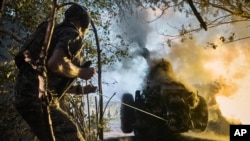Latest developments:
- Ukraine’s military intelligence reported Saturday that Russia continues to deliver mines and explosives around the Zaporizhzhia Nuclear Power Plant. The IAEA’s on-site experts say they have not yet found any explosives during their inspections of the nuclear plant but note they have not been granted access to inspect the rooftops.
- Turkey favors Ukraine’s entrance into NATO. “Without a doubt, Ukraine deserves to be in NATO,” President Recep Tayyip Erdogan said, during Ukrainian President Volodymyr Zelenskyy’s visit to Istanbul.
- Wagner mercenary fighters are preparing to move to Belarus under the agreement that averted their mutiny against Russia's military leadership, a senior commander of the group was quoted as saying. The exact whereabouts of Wagner leader Yevgeny Prigozhin and his mercenaries is unclear.
U.S. allies and Russia reacted Saturday to the U.S. decision to supply Ukraine with controversial cluster munitions that are banned by more than 100 countries, though not the U.S., Russia and Ukraine.
Canada, one of Ukraine’s most vocal advocates, as well as military and humanitarian supporter, asserted its full compliance with the 2008 Oslo Convention on Cluster Munitions. “We take seriously our obligation under the Convention to encourage its universal adoption," the federal government said in the statement.
Britain, another signatory to the convention, “prohibits the production or use of cluster munitions and discourages their use,” Prime Minister Rishi Sunak stated Saturday.
"No to cluster bombs and yes to the legitimate defense of Ukraine, which we understand should not be carried out with cluster bombs,” Spain agreed in its statement.
Another U.S. ally, Germany, and U.N. Secretary-General Antonio Guterres also expressed opposition to the U.S. decision.
Ukrainian Defense Minister Oleksii Reznikov welcomed the U.S. announcement to deliver cluster bombs to Kyiv and promised the munitions would be used only in Russian-occupied Ukrainian territories and not in Russia.
Reznikov said on Twitter that the new weapons “will significantly help us to de-occupy our territories while saving the lives of the Ukrainian soldiers.” For this reason, he said, “we need to inflict losses on the enemy — war criminals, rapists and looters — who are occupying our territories. The more losses we inflict on them, the more lives of Ukrainian people we will be able to save,” he said.
Reznikov pointed out that cluster munitions will specifically be used “only in the fields where there is a concentration of Russian military.” He emphasized that such munitions will not be used in urban areas to avoid the risks for the civilian populations. “These are our people; they are Ukrainians, and we have a duty to protect,” he wrote.
Cluster munitions typically release large numbers of smaller bombs that can kill indiscriminately over a wide area. Those that fail to explode upon contact with the ground then pose a danger for decades.
Oksana Markarova, Ukraine’s ambassador to the U.S., said Friday in an interview with VOA’s Ukraine Service that the cluster bombs from the U.S. are “of a much better quality and much safer than the typical cluster munitions that people are talking about.” She said the cluster munitions “will help us to faster liberate our territories.”
Moscow described the U.S. decision as another egregious example of Washington's anti-Russian course.
President Joe Biden defended the U.S. move Friday, calling it a “difficult decision.”
“It took me a while to be convinced to do it,” Biden said in a CNN interview, underscoring the cluster munitions would help Ukraine to “stop those [Russian] tanks from rolling."
Biden’s decision circumvents U.S. law prohibiting the production, use or transfer of cluster munitions with a failure rate of more than 1% by allocating the munitions from existing defense stocks under the Foreign Assistance Act once the president deems that such a provision is in the U.S. national security interest.
The move comes amid concerns that Kyiv’s counteroffensive is going more slowly than anticipated against entrenched Russian troops and that Kyiv is diminishing Western stocks of conventional artillery.
Colin Kahl, the Pentagon's top policy adviser, told reporters it is too soon to draw any conclusions about Kyiv's battlefield gains. He added that Russia was more successful digging in "than perhaps was fully appreciated."
The cluster munition supply is part of an $800 million security package that brings the total U.S. military aid to Ukraine to more than $40 billion since Russia's February 2022 invasion.
500 days
Ukrainian President Volodymyr Zelenskyy observed the 500th day of Russia’s invasion of Ukraine from the liberated Snake Island in the Black Sea.
The Ukrainian president thanked soldiers during a morning address Saturday.
“I thank you! Thank you to everyone who fights for Ukraine. … We will definitely win,” he said.
In a statement marking the 500 days of war in Ukraine, U.S. Secretary of State Antony Blinken hailed Ukraine’s resilience.
“The United States remains committed to helping Ukraine defend itself and to rebuild its future. Each day, the people of Ukraine demonstrate their resilience and unity in defending against Moscow’s brutal, relentless assaults. In the face of enormous adversity, the people of Ukraine inspire the world, reminding us of the importance of upholding the tenets of the U.N. Charter,” the top U.S. diplomat said.
NATO aspirations
NATO Secretary-General Jens Stoltenberg told reporters in Brussels on Friday that NATO members meeting in Vilnius, Lithuania, next week would reaffirm their goal for Ukraine to eventually become a member of the alliance. Membership talks are not expected, however, until after the war is over.
When asked when, or how, Ukraine might join the alliance, Stoltenberg said the “most important thing now is to ensure that Ukraine prevails” in its fight against Russia.
In his CNN interview Friday, Biden said he does not think there is a consensus right now among NATO member states to welcome Ukraine into the military alliance.
Zelenskyy has acknowledged it is unlikely Kyiv will be able to join NATO while at war with Russia. During his tour of NATO countries before the two-day NATO summit next week in Vilnius, Lithuania, Zelenskyy tried to rally support for Ukraine’s entrance into the military alliance.
VOA White House Bureau Chief Patsy Widakuswara, VOA National Security Correspondent Jeff Seldin, and VOA U.N. Correspondent Margaret Besheer contributed to this report. Some information for this story was provided by The Associated Press, Agence France-Presse and Reuters.







